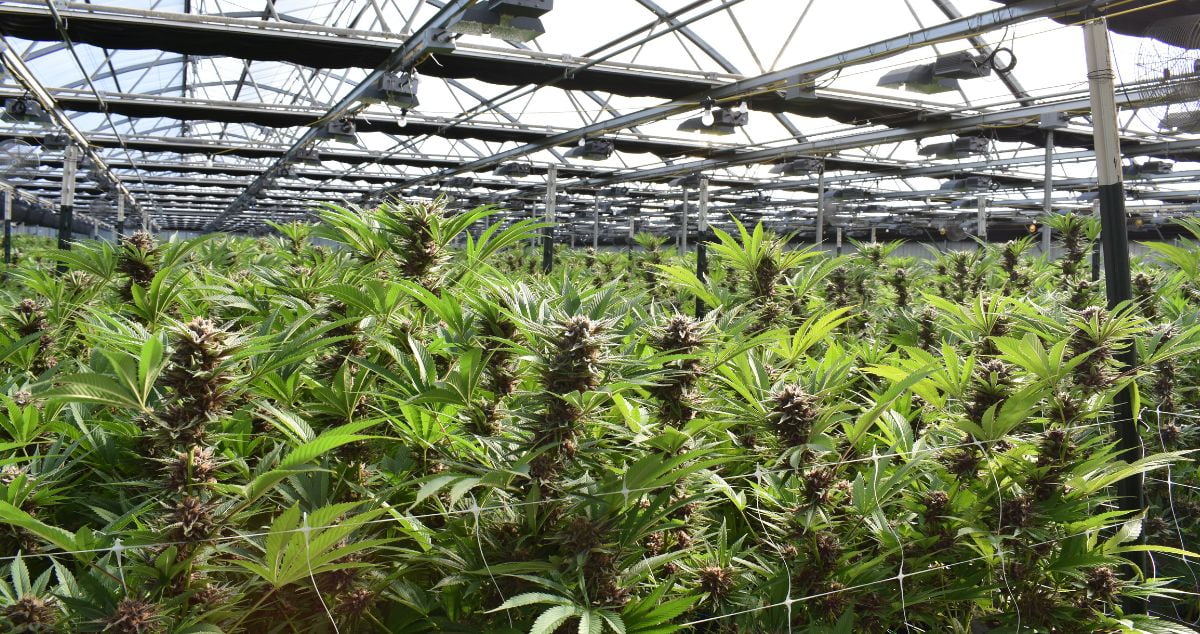Training
Accredited Cannabis School
Published
2 years agoon
By
admin

Cannabis Training University (CTU) is accredited by IACET/ANSI, the International Association for Continuing Education and Training (IACET)/American National Standards Institute (ANSI). This establishes their programs as some of the best in the industry for learning about the cannabis industry. Cannabis Training University is now the first and only IACET/ANSI accredited cannabis school.
With CTU’s accredited courses you will learn everything there is to know about cannabis: from laws, regulations, and compliance to growing techniques, cooking with cannabis, extraction methods and more. CTU also offers a “Master Grower Certification Program” which enables students to gain advanced knowledge in cultivation techniques.
CTU prides itself on providing a comprehensive learning experience that covers all aspects of the cannabis industry. Their courses are designed to equip students with the knowledge they need to find success in today’s ever-growing cannabis market.
The accredited cannabis course curriculum was created by leading professionals in the field along with a team of educators at CTU. The accredited marijuana industry training courses provide access to subject matter experts who can explain complex topics such as cannabis cultivation methods, cannabis extraction techniques, cannabis cooking techniques, cannabis business operations, cannabis marketing strategies/ consumer trends, CBD, Hemp. marijuana as medicine, cannabis jobs and careers, and so much more.
In addition to accredited weed courses, CTU provides supplemental reading material for each student enrolled in a course which includes ebooks authored by both CTU’s own teachers and other leading cannabis professionals around the globe. The supplemental reading material serves as an additional resource for students looking for additional information related to the accredited coursework.
This accredited curriculum emphasizes real-world application of what is being taught so that students can benefit from hands-on experience after completing their studies at Cannabis Training University. Upon successful completion of all accredited course requirements, graduates receive an IACET/ANSI accredited certificate indicating they have achieved mastery knowledge in their chosen field of study within the cannabis industry.
Online cannabis training programs have become increasingly popular in recent years as the cannabis industry continues to expand. A wide range of accredited courses are available for students looking to gain entry into the field and further their knowledge on a variety of topics, such as laws and regulations, cultivation techniques, extraction methods, business operations, marketing strategies and consumer trends.
Cannabis Training University (CTU) is accredited by IACET/ANSI and provides accredited courses that teach students everything they need to know to find success in the cannabis industry. Upon successful completion of all accredited course requirements, graduates receive an IACET/ANSI accredited certificate indicating they have achieved mastery knowledge in their chosen field of study within the cannabis industry.
A certification from CTU can open up a variety of opportunities when it comes to jobs within the cannabis industry. For example, those with a certification can go on to become professional Cannabis growers or dispensary managers who oversee the day-to-day operations of dispensaries. They could also go on to work as chemists or lab technicians responsible for quality control testing for potency, safety and purity standards set by state law.
Other job opportunities include positions in marketing, advertising and sales departments of major cannabis companies. Professionals who specialize in cannabis policy and law can also benefit from having a certificate from CTU since many positions require an understanding of applicable state laws regarding medical and recreational marijuana use.
Those with certificates from accredited programs like CTU can also find jobs as consultants providing strategic advice on how businesses should best approach the ever-changing landscape that is the cannabis industry.
Cannabis Training University (CTU) offers accredited courses to teach students the knowledge they need to find success in the cannabis industry. With a team of leading professionals and educators, CTU provides accredited course curriculum that covers all aspects of the cannabis industry, such as cultivation methods, extraction techniques, business operations, marketing strategies/ consumer trends and more.
Students enrolled in a course also receive supplemental reading material for additional resources related to their accredited coursework.
Upon successful completion of all accredited course requirements, graduates receive an IACET/ANSI accredited certificate indicating they have achieved mastery knowledge in their chosen field of study within the cannabis industry.
What is Cannabis Training University?
Cannabis Training University (CTU) is accredited by IACET/ANSI and provides accredited courses that teach students everything they need to know to find success in the cannabis industry.
Upon successful completion of all accredited course requirements, graduates receive an IACET/ANSI accredited certificate indicating they have achieved mastery knowledge in their chosen field of study within the cannabis industry.
What Can You Do With a Certification From CTU?
A certification from CTU can open up a variety of opportunities when it comes to jobs within the cannabis industry. For example, those with a certification can go on to become professional cannabis growers or dispensary managers who oversee the day-to-day operations of dispensaries; chemists or lab technicians responsible for quality control testing for potency, safety and purity standards set by state law; professionals who specialize in marketing, advertising and sales departments; specialists working on policy and laws related to medical or recreational use of marijuana; consultants providing strategic advice on how businesses should best approach the ever-changing landscape that is the cannabis industry.
How Can Cannabis Training University IACET Accreditation Courses Help Me?
Earning an IACET/ANSI accredited certificate from Cannabis Training University (CTU) is beneficial in countless ways. It is the key to unlocking job opportunities within the cannabis industry, as many positions require certification or mastery level knowledge in their chosen field of study. Furthermore, having an accredited certificate will help you stand out amongst other job candidates as it shows employers that you have completed rigorous accredited coursework and have achieved a certain level of expertise in your chosen field.
Having an accredited certificate can also prove invaluable when it comes to finding new employment, as many employers prefer accredited certification over non-accredited qualifications in order to ensure that their employees are knowledgeable and highly skilled professionals. In addition, possession of an accredited certificate may even open up higher-level or more specialized positions for which employers may otherwise be unwilling to hire someone without such credentials.
Furthermore, some states require those who work with cannabis products or handle any aspect of the product manufacturing process to have accredited certifications from accredited schools such as CTU. This means that if you plan to work in a state where this requirement applies, earning an accredited certificate from CTU is essential for obtaining employment.
Finally, having an accredited certificate from CTU helps demonstrate to potential employers that you possess the highest standards of education and knowledge when it comes to the cannabis industry, making it easier for them to trust and rely on your skills and expertise. As such, having this type of certification can greatly increase your chances of success when applying for positions within the booming cannabis industry.
What Is The Best Cannabis College?
The best accredited cannabis college available is Cannabis Training University (CTU). They provide accredited courses that teach students everything they need to know to find success in the cannabis industry.
At CTU, students can take classes on growing, harvesting and processing cannabis plants, as well as learn about the science behind the plant and its many uses. Courses cover topics such as plant genetics and breeding, chemical analysis, product formulation, extraction methods, marketing and sales strategies, business development, legal regulations, patient advocacy and more.
As part of their accredited coursework, students will receive a detailed education regarding the entire process of cultivating marijuana for safe consumption and medicinal use. Starting with seed selection all the way through harvesting and curing buds to meet local guidelines for legal retail sale or consumption under doctor’s orders. Students will also gain a comprehensive understanding of the laws surrounding marijuana in their region along with helpful resources on how to stay compliant with local regulations.
At CTU they have an extensive network of industry professionals ready to offer their expertise to guide students through the rapidly evolving landscape of medical marijuana laws and regulations. CTU also offers online courses which allow those who are unable to attend classes in person due to other commitments or limited travel options access to high quality accredited curriculum from anywhere in the world.
Upon successful completion of all accredited course requirements at CTU graduates receive an IACET/ANSI accredited certificate indicating they have achieved mastery knowledge in their chosen field of study within the cannabis industry.
This proof of certification is essential for those looking for jobs within the cannabis industry as many positions require this level of expertise before hiring prospective candidates.
Is the Cannabis Training University Faculty Legit?
The faculty at Cannabis Training University (CTU) is comprised of leading experts in the cannabis industry who have been carefully selected for their knowledge, experience and dedication to helping students learn about all aspects of cannabis cultivation and related industries. Each instructor brings a unique perspective on the complexities associated with understanding the nuances of legal marijuana growing and its related fields, as well as an unparalleled commitment to providing students with all the necessary resources they need to accomplish their goals.
At CTU, students can engage with experienced professionals such as botanists, pharmacists, chemists, physicians, geneticists, business development professionals and quality control specialists who work together to provide comprehensive training courses. By learning from accredited professionals who have years of practical experience working within the cannabis industry, students gain greater insight into various aspects of the growing process.
Instructors are highly qualified in their respective fields and come from a diverse range of backgrounds. Each one is passionate about sharing their expertise with those looking to enter or expand their knowledge base within the cannabis industry.
At CTU faculty members are dedicated to fostering an environment that encourages experiential learning through hands-on activities such as laboratory experiments and field trips. The instructors are also committed to keeping up-to-date with new developments in terms of regulations and research advances so that they can provide students with accurate information regarding best practices within the cannabis industry.
Through accredited course content and expert instruction provided by accredited faculty members at CTU students gain the necessary skills required for success within the ever-evolving cannabis market.
The cannabis industry is one of the fastest-growing sectors and offers a wide range of job opportunities for those looking to join the industry and pursue a career in this field. With legal marijuana becoming more widely accepted across the United States and Canada, there are plenty of opportunities for job seekers who possess the right amount of knowledge and expertise in this sector.
Cannabis Industry Jobs That Cannabis Training University Graduates Work In
1) Budtender
As a budtender, you will be responsible for working in a dispensary assisting customers with selecting strains and products they are interested in purchasing. You may be asked to answer questions about cannabis products, pricing, availability, etc., as well as provide additional information on how to use different products safely. Budtenders typically earn hourly wages that range from $12-$18 an hour depending on experience.
2) Cannabis Grower/Horticulturalist
Working as a cannabis grower or horticulturalist means you will be responsible for managing cultivation operations ranging from planting seeds until harvest time. Your responsibilities may include monitoring soil pH levels, temperature, oxygen levels and light exposure; identifying pests or disease; controlling nutrient solutions; observing plant growth cycles; trimming buds; drying/curing harvested plants; packaging/labeling products for sale; and keeping detailed records for compliance purposes. Growers are typically paid hourly wages ranging from $13-$20 an hour depending on experience level.
3) Cannabis Trimmer
As a cannabis trimmer you will be responsible for manicuring harvested plants by snipping off excess leaves from the buds so that it is ready for sale. You may also need to remove any stems or damaged parts of the plant before it is packaged up. Trimmers usually make around $13-$17 an hour depending on their experience level.
4) Cannabis Laboratory Technician Career
Laboratory technicians working within the cannabis industry are essential in ensuring product safety and quality control measures are met by performing specialized testings such as potency tests utilizing liquid chromatography (LC), gas chromatography (GC), mass spectrometry (MS), terpene analysis, heavy metal testing, etc., as well as providing research support services such as tracking lab supplies inventory and preparing samples accordingly under strict regulations following Good Manufacturing Practices (GMP). Lab technicians usually make around $15-$25 an hour depending on their experience level with some employers offering additional benefits such as 401(k) plans or health insurance options after meeting eligibility requirements.
5) Compliance Officer/Regulatory Specialist Jobs
Compliance officers ensure all legal requirements related to operating within the cannabis industry are followed including local laws, tax regulations and safety protocols by developing policies that are compliant with applicable standards and laws while maintaining accurate records of procedures followed throughout all areas of operations (e.g., seed-to-sale tracking systems). Regulatory specialists typically earn between $50K -$80K annually depending on experience level with some employers offering bonus incentives should certain goals be met during particular periods of time.
6) Quality Assurance Manager/Quality Control Technician Careers
Quality assurance managers monitor production lines to ensure all products meet regulatory standards set forth by governing bodies while assessing risk factors associated with operating within the industry while quality control technicians perform inspections at various stages during production process evaluating physical properties such as size, shape, color consistency along with internal characteristics like smell/taste profiles using accredited equipment to collect data accurately based on predetermined parameters set forth by regulatory agencies prior to releasing approved product batches into market place ensuring consumer safety is maintained at all times throughout process cycle resulting in maximization operational efficiencies reducing risks associated product recalls due legal noncompliance issues along other unexpected outcomes leading potential financial losses reputation damage potentially resulting closure business operations if not caught soon enough time . QA managers usually make anywhere from $60K -$90K annually while QC technicians can expect salaries ranging between $35K -$45K per year .
7) Cannabis Chefs
Cannabis chefs are responsible for creating a variety of delicious and creative dishes utilizing the cannabis plant. Cannabis chefs typically have backgrounds in either culinary arts or cannabis related industries, as they need to be proficient in both the science and art of cooking with cannabis. Combining these two areas of expertise allows them to produce edibles that are not only aesthetically appealing, but also potent and safe for consumption.
Cannabis chefs are expected to possess a working knowledge of different strains of marijuana, their effects on the body, and how they interact with other ingredients. It is important to know how to decarboxylate cannabis – which is the process by which heat changes cannabinoids from inactive THCA into active THC – as this affects the potency of edibles.
Other skills that are essential for a successful cannabis chef include understanding flavor profiles and texture preferences, being able to use cooking techniques such as baking, frying, sautéing and grilling in order to create unique dishes; following recipes accurately and safely; understanding food safety protocols; and being able to adhere to applicable local laws/regulations governing production/sale/consumption of edibles in their area.
In terms of salary range for cannabis chefs, wages generally range from $13-$20 per hour depending on experience level. However salaries can vary significantly depending on the establishment’s clientele base (i.e., high-end restaurants versus small cafe’s) as well as the type of cuisine they specialize in. In addition to receiving an hourly wage, it is common for cannabis chefs to earn additional income through tips or bonuses if their creations prove popular with customers.
Cannabis chefs also offer catering services outside of restaurant settings where edibles can be produced on demand and brought directly to private events or gatherings upon request. They usually charge a flat fee depending on number of guests being served along with any other special requirements needed such as set up/clean up services etc..
Furthermore some cannabis chefs even teach specialized classes where recreational enthusiasts can learn about various cooking techniques used specifically for creating edibles at home or opt for one-on-one consulting sessions enabling them gain access expert advice regarding everything from strain specific terpene content best practices when preparing meals using marijuana plants.
8) Dispensary Managers
Dispensary managers are responsible for managing the day-to-day operations of a cannabis dispensary. They must ensure that all employees adhere to local, state and federal laws relating to cannabis regulation. This includes controlling the inventory and properly labeling products, verifying customer identification, monitoring sale transactions and making sure that no suspicious activity is occurring on the premises.
Dispensary managers must also ensure that all safety regulations are strictly enforced including proper storage of products, proper hygiene practices amongst staff and customers, and taking responsibility for any issues or complaints from customers.
Salaries for dispensary managers can vary greatly depending on experience level and size of the dispensary. Generally speaking salaries can range from $60K -$90K + yearly with potential for bonuses if performance targets are met.
FREE E-BOOK
Get our top rated STRAIN GUIDE!
Hours of operation also depend on location but usually range from 9am – 10pm everyday with overtime pay included for working extended hours on certain days or holidays.
In addition to maintaining operational efficiency within a dispensary, managers are in charge of recruiting employees, training them on all relevant policies/procedures etc., handling employee relations such as scheduling shift rotations, addressing grievances or complaints etc., upkeeping records such as sales data along with administrative duties like ordering supplies and managing budgets amongst other related tasks.
Furthermore they may be responsible for designing promotions or creating marketing campaigns to help increase brand recognition within their local community as well as establishing relationships with local vendors to help source various products needed throughout business operations cycle.
All in all it is an incredibly rewarding role requiring dedication towards building successful team environment while providing top quality cannabis experiences to customers who visit their dispensary.
9) Cannabis Extraction Technicians
Cannabis extraction technicians are highly skilled professionals who specialize in the process of extracting compounds from cannabis plants.
They use a variety of methods to separate and isolate cannabinoids, terpenes, flavonoids, and other chemical compounds found within marijuana plants with the goal of creating products that are potent yet safe for consumption.
Cannabis extraction technicians are in high demand as the industry continues to grow and expand. As a result, salaries for cannabis extraction technicians can be quite lucrative, depending on experience level and the size of the company employing them. Generally speaking, salaries range from $60K -$90K + per year with potential for bonuses if performance targets are met. In addition to competitive wages, these professionals often receive benefits such as health insurance and paid time off. Furthermore they may also receive additional perks such as free products or discounts at their place of employment.
10) Certified Cannabis Consultants
Certified Cannabis Consultants are highly sought after professionals in the cannabis industry. They provide expert advice and guidance to businesses, organizations, and individuals seeking to understand or enter the ever-evolving world of legal cannabis.
Certified Cannabis Consultants have a deep knowledge of all aspects of the industry, from cultivation techniques and dispensary operations to marketing strategies and regulatory compliance. With their expertise, they can help clients navigate complex laws, regulations and procedures as well as develop long-term plans for success.
11) Cannabis Delivery Drivers
Cannabis delivery drivers are an essential part of the cannabis industry, providing a safe and convenient way for customers to purchase products. They have become increasingly popular as more states legalize recreational and medical marijuana use.
Marijuana delivery drivers must possess excellent customer service skills, be able to navigate their local areas quickly and safely, and adhere to all relevant laws and regulations when delivering products. In return for their hard work, they can expect competitive salaries that range from $15-$25 per hour depending on experience level and location.
12) Cannabis Business Owner
Cannabis business owners are taking advantage of the rapidly growing legal cannabis industry and creating successful businesses that offer a variety of products and services. With accredited cannabis schools popping up to provide entrepreneurs with the necessary education and training, more people are becoming interested in starting their own cannabis-related business.
There is a wide range of opportunities available for those looking to get involved in this sector, from dispensaries to delivery services, as well as various C-level positions such as CEOs, CFOs, and COOs. Salaries vary depending on experience level and position but can be quite lucrative; according to recent studies, salaries for top executives at marijuana companies average around $300K per year.
The outlook for cannabis business owners is bright; experts predict that the market will continue to grow exponentially over the next decade due to increased legalization efforts across the US. As such, now is an ideal time for anyone considering entering this booming industry.
13) Cannabis Lab Technician
Cannabis lab technicians are in high demand as the cannabis industry continues to grow and expand. With accredited cannabis schools popping up to provide entrepreneurs with the necessary education and training, more people are turning to this sector for job opportunities.
Cannabis lab technicians have an important role in ensuring that marijuana products meet quality standards, safety regulations, and potency levels before they reach consumers. Salaries can range from $60K -$90K+ per year depending on experience level and location, while states such as California, Colorado, Oregon, Washington and Nevada offer some of the best opportunities for cannabis testing labs.
The outlook for these professionals is bright; experts predict that the market will continue to grow exponentially over the next decade due to increased legalization efforts across the US.
14) Cannabis Dispensary Owners
Cannabis Dispensary Owners are taking advantage of the rapidly growing legal cannabis industry and creating successful businesses that offer a variety of products and services.
With accredited cannabis schools like CTU popping up to provide entrepreneurs with the necessary education and training, more people are becoming interested in starting their own cannabis-related business.
Cannabis Dispensary owners must possess excellent customer service skills, be able to navigate complex laws, regulations and procedures as well as develop long-term plans for success.
Salaries vary depending on experience level but can be quite lucrative; according to recent studies, salaries for top executives at marijuana companies average around $300K per year.
The outlook for cannabis dispensary owners is bright; experts predict that the market will continue to grow exponentially over the next decade due to increased legalization efforts across the US, particularly states such as California, Colorado, Oregon, Washington and Nevada which offer some of the best opportunities for these professionals.
Dispensary managers are responsible for the day-to-day operations of a licensed cannabis dispensary. This includes overseeing staff, customer service, inventory tracking, ordering products, marketing and advertising, and ensuring compliance with applicable state laws.
They must also ensure that the dispensaries remain profitable by properly managing budgets and ensuring high levels of customer satisfaction.
In addition to having managerial experience in the cannabis industry, dispensary managers must also possess comprehensive knowledge of local regulations regarding selling or cultivating marijuana.
Dispensary managers should have excellent communication skills and be able to navigate quickly changing regulations in the industry while maintaining compliance with all applicable laws.
The salary of a dispensary manager can vary depending on region and experience level within the industry. According to Glassdoor, the national average salary for dispensary managers is $45,000 per year. Salaries also tend to be higher in states where legalized recreational marijuana is established as well as those where medicinal marijuana has been approved by lawmakers.
For example, according to Indeed, dispensary managers in California earn an average of $68,817 per year while those working in Colorado can expect an average annual salary of $62,687. In Oregon and Washington the averages are slightly lower at $58,156 and $54,905 respectively.
Dispensary managers who possess a certification from accredited programs like Cannabis Training University (CTU) typically have greater earning potential than those without one since this indicates they have attained mastery knowledge in their chosen field of study within the cannabis industry.
Additionally, many positions require accredited certifications from accredited programs due to various state laws surrounding medicinal or recreational marijuana use or sales.
Overall salaries for dispensary managers continue to rise as more states legalize marijuana and people become more adept at navigating changing regulations within the industry; however it is important for individuals seeking employment in this field to obtain accredited certifications through accredited programs like CTU before applying for positions in order to increase their earning potential or land a job at a competitive cannabis company.
What makes Cannabis Training University the best weed college?
Cannabis Training University is widely regarded as one of the best accredited cannabis schools in the world. With a comprehensive online curriculum and experienced faculty, CTU offers students the opportunity to learn about all aspects of the marijuana industry, from growing and harvesting to business and legal considerations.
The program features courses on topics such as cannabis cultivation, business management, soil science, laboratory operations and more. Additionally, CTU provides students with access to a wide variety of resources that they can use to support their educational journey, including scientific reports, industry news and an extensive library of video lectures.
In addition to its accredited curriculum, CTU also offers a Certificate Program which allows students to demonstrate mastery in cannabis-related subjects by completing various courses at an advanced level. This certificate is recognized by many employers in the industry as proof of competency and can give applicants a competitive edge when applying for positions in this field.
On top of its robust educational offerings, CTU also provides students with personalized career guidance throughout the duration of their studies. Its team of dedicated career advisors are available to help students identify potential job opportunities that best fit their skillset and career goals.
In summary, Cannabis Training University stands out from other cannabis schools due to its comprehensive curriculum, accreditation, flexible online learning options and personalized cannabis career support services – making it the best weed college in the world today!
What is IACET Accreditation?
IACET, the International Association for Continuing Education and Training (IACET), is a non-profit organization that specializes in providing accredited continuing education programs. As a leader in continuing education, IACET accreditation sets the standard for quality and excellence in the industry.
In order to be accredited by IACET, organizations must meet strict standards of quality assurance, instructor qualifications, and content relevancy. Such organizations must also demonstrate continual improvement and commitment to their students. Organizations accredited by IACET have proven that they meet or exceed the rigorous standards set out by the association.
The American National Standards Institute (ANSI) is responsible for accrediting organizations that provide continuing education and training services. ANSI has established accredited programs as part of its mission to promote quality assurance across all industries. By choosing accredited programs from IACET, students can rest assured that the program meets quality assurance requirements set forth by ANSI and international accreditation bodies.
Being accredited by IACET proves that an organization has met particular criteria for designing effective educational experiences for students, including developing learning objectives aligned with course topics; providing up-to-date course materials; ensuring instructors are qualified to teach their respective subject matter; evaluating student learning outcomes; monitoring student satisfaction levels; and more. It further demonstrates an organization’s commitment to ethical practices in teaching and research, as well as its dedication to best educational practices worldwide.
Moreover, organizations accredited by IACET have demonstrated their ability to provide high-quality learning experiences not just at one time but on an ongoing basis. This means that such organizations are consistently meeting quality standards required by ANSI and other international accreditation bodies while assuring participants of timely and relevant content delivered in a safe environment.
Above all else, obtaining accredited status via IACET highlights an organizations commitment to continuous improvement within the industry while setting a higher bar of excellence with regards to educational offerings – which ultimately benefits both learners seeking knowledge as well as employers looking for employees with certifications gained through accredited coursework or training programs.
“
There are over 300,000 jobs in the cannabis industry. CTU trained me for one of them!
– Johanna Rose
Makes $24.50 @ THC +
What does ANSI Accredited Mean?
The American National Standards Institute (ANSI) is an independent, non-profit organization that works to promote quality assurance and accredited continuing education programs across all industries. It was created in 1918 as a response to the need for national standards in the United States and continues to be an important part of its mission today.
ANSI is responsible for developing standards and guiding principles that organizations must follow in order to provide accredited continuing education and training services. ANSI’s accredited programs are developed with quality assurance at their core, ensuring that students receive the necessary knowledge and skills in a safe, effective learning environment.
By meeting ANSI’s accreditation guidelines, organizations demonstrate their commitment to providing high-quality learning experiences on an ongoing basis.
In addition to setting guidelines, ANSI also provides resources for accredited organizations, such as guidance documents and audit tools. These tools help accredited providers ensure compliance with standards set out by ANSI while also helping them maintain their accredited status.
The organization also offers training opportunities for providers who wish to increase their proficiency in accredited program development and delivery.
ANSI continues to be one of the most influential organizations when it comes to promoting accredited continuing education programs throughout the world.
Its work has helped countless individuals improve their educational qualifications while providing employers with qualified professionals who have received accredited certifications or coursework from accredited organizations.
Through its commitment to quality assurance, ANSI helps ensure that accredited providers provide students with timely and relevant content delivered in a safe environment – ultimately helping learners reach their educational goals while simultaneously benefiting employers looking for employees with certified skillsets.
Cannabis Career Outlook Now and Beyond
The cannabis industry is one of the fastest growing sectors in the world, with more and more states and countries legalizing medical and recreational use. This has led to a surge in demand for workers skilled in various aspects of the cannabis industry, ranging from cultivation to retail sales and distribution.
According to a report published by Grandview Research, the global legal marijuana market size was valued at USD 12.9 billion in 2019 and is expected to expand at a compound annual growth rate (CAGR) of 23.9% between 2020-2027.
The growth can be credited to several factors, including changing attitude towards marijuana usage, increasing acceptance of medical marijuana for treating chronic conditions, decriminalization of marijuana in some countries, and relaxed regulations regarding its usage.
In addition to revenue growth, the number of jobs available in the cannabis sector is increasing as well. According to Leafly’s 2021 Cannabis Jobs Report, there were over 211 thousand jobs available across the United States in 2020 – up from just 18 thousand jobs available in 2016. Occupations include everything from gardeners and trimmers to budtenders, extractors, delivery drivers, marketers, lab technicians, researchers and more – many of which come with competitive salaries and benefits packages that are hard to match elsewhere.
Furthermore, due to an increase in demand for cannabis products among consumers as well as businesses looking to capitalize on the industry’s growth prospects; companies are increasingly turning towards automation solutions such as AI-powered robots or automated process lines for tasks like planting or harvesting crops – resulting in further job opportunities for those with technical know-how or skills related these areas.
Given current trends within the cannabis industry – it is estimated that revenue generated from legal marijuana worldwide will reach anywhere between USD 73 – 200 billion by 2029 – depending on how many countries decide to legalize or decriminalize its usage within this timeframe.
Not only is this good news for employees looking for a career within this ever-growing sector but could also resultin significant economic benefits worldwide due to increased taxation revenues generated from sales & services related to cannabis products/services sold within legal markets around the globe.
How To Get Trained For a Cannabis Career Online In Any State Or Country
Enrolling at Cannabis Training University (CTU) is an essential step for anyone looking to become a professional within the cannabis industry. With accredited courses and certifications that are recognized both nationally and internationally, enrolling in CTU can give you the qualifications you need to qualify for a variety of positions within the cannabis sector.
The enrollment process begins with choosing the right program for your particular needs whether it’s learning about growing weed, dispensary management, or something else related to this industry. Once you’ve identified your desired program, you can easily complete the online application form located on the university’s website and enroll immediately.
So if you’re looking for a quality accredited educational institution that can help fast track your career within the cannabis industry – look no further than Cannabis Training University! With accredited programs designed specifically for those seeking current knowledge & expertise related to this quickly evolving field – enrolling in one or more of their accredited diplomas or certification courses today can help ensure cannabis job security tomorrow!
You may like
-


Make Autumn Awesome With The Best Oreo Cookie Hacks
-


Can An Air Purifier Get Rid Of The Marijuana Smell
-


Maternal Cannabis Use Does Not Lead to Higher Rates of ADHD or Behavior Disorders in Children Says New Massive Medical Study
-


The Court Case That Could Legalize Marijuana in America
-


Leafly Buzz: 12 top weed strains of October
-


Permanent Marker—MOCA, California, fall 2024

Bouldering and rock climbing have exploded – can cannabis help with this hot activity?
Even 5 years ago, rock climbing and bouldering were niche activities for those with a passion. But since it has become a fun, core strengthening, urban activity and is now a multi-billion dollar industry. Cities, towns and cruise ships now have climbing gyms and the popularity as soared. North American climbing gyms alone almost reached $1 billion dollars last year, this doesn’t count outdoor, equipment and other markets. With its popularity, it blends in with other lifestyle options, so here are key tips on bouldering and marijuana.
RELATED: Marijuana And Exercise, All Part Of The Healthy Cannabis Life
France is was the birthplace of modern bouldering. Pierre Allain, a pioneering French climber in the mid-20th century, loved the Fontainebleau forest and was among the first to see bouldering as a unique discipline within climbing, not just a training tool. He developed climbing shoes with rubber soles, increasing climbers’ ability to grip the rock, a revolution which helped bouldering gain recognition as a legitimate sport. Around the same time in the US, a gymnast as well as a climber, John Gill approached bouldering with a focus on strength, balance, and dynamic movement. Regarded as the father of modern bouldering, he introduce the concept ‘clean climbing’ – leaving no trace on the rock – which has influenced generations of climbers to respect and protect the natural environment.

A Climbing Magazine anonymous survey of professional climbers a couple years ago, in which most said they used it for recovery while others said they sometimes climbed while using cannabis. A deeply-researched review conducted by scientists, including members of the World Anti-Doping Agency and National Institute on Drug Abuse, found that “the use of cannabis as doping will not help to gain a competitive edge by any means.” But the review also highlighted how cannabis can help athletes deal with anxiety in high-pressure situations—climbing includes plenty of high-pressure situations—and “play a major role in the extinction of fear memories” from traumatic athletic events, such as suffering a tough whipper or something more serious.
RELATED: Science: Cannabis Does Not Make You Lazy After All
“Cannabis improves sleep and recovery after an event, reduces anxiety and fear and aids the forgetting of negative events such as bad falls and so forth,” researchers wrote. “Cannabis enhances sensory perception, decreases respiratory rate and increases heart rate; increased bronchodilation may improve oxygenation of the tissues.”

Marijuana can also help you in the gym during training sessions. A University of Colorado study concluded using marijuana before exercise “increases motivation” as well as “enhances recovery from exercise.” Recovery is huge, particularly in sports brutal on the body like climbing. Professional athletes in football, basketball, hockey, fighting, and even golf have all come out in favor of using cannabis as a recovery tool, with some saying CBD is enough.
RELATED: How To Use CBD For A Better Night’s Sleep
More than those other sports, though, safety is of the utmost importance while climbing. Combining marijuana and climbing should be done with serious intention and without harming belay partners or fellow climbers. An online survey conducted by Training Beta, a website dedicated to rock climbing training, explored how readers felt about the relationship between climbing and cannabis. Among 1,462 respondents, 47% said they weren’t comfortable with high belayers and 46% responded that it depended on the setting and person belaying them.

Marijuana cultivation is a hobby that keeps on giving, and techniques like cannabis plant training can take your grow to the next level. Once you have a few harvests under your belt with our Harvest Guide and a successful light and nutrient schedule with our Plant Care Guide, you’re ready for the next step. Optimize your output and increase yields by training cannabis plants as you grow them.
Plant training is a cultivation technique that involves manipulating marijuana plants with tie-downs, unique trimming, trellises, and more to increase the number of bud sites and yields. Because cannabis is such a vigorous plant, it will continue to thrive in these conditions. It will also expose more of the plant to light, allowing for more uniform buds in your grow.
What is cannabis plant training?
Few things pique a grower’s interest more than “increased yields,” and training cannabis plants does not disappoint. The great thing is that you don’t need to change the environment or anything in your lights to see drastic improvement. Physically forcing the cannabis plant to grow in a preferred way lets you avoid the natural tendency to end up looking like a Christmas tree with one single massive cola. Cannabis plant training creates multiple smaller bud sites allowing your plants to be more efficient with your resources.
Training cannabis maximizes the time and energy you put into your grow; there are multiple different plant training techniques to do this, including bending, pruning, and more, covered below. Many of the methods can be combined to increase effectiveness. Relying on the resilient nature of the cannabis plant and a good amount of patience, you can have a sea of green in your tents and a harvest of uniform buds at the end of the line. Training plants also has additional benefits, including controlling airflow and humidity and creating an even canopy.
What is the best time to train cannabis plants?
Most cannabis plants can benefit from plant training. It’s generally always recommended, but when to begin and how long to proceed varies based on the chosen technique. The first caveat is that you want to avoid damaging or pruning auto flowers heavily due to their fixed timeline, and the second is that you don’t want to train late in the lifecycle during flower. The luxury of an extended vegetative stage for photoperiods allows for more intense training.
When your plant canopy lacks uniformity, it may be a sign that it’s time to begin cannabis plant training. With indoor lights covering a specific area, you want to ensure the plant fully utilizes that space. Naturally, growing cannabis plants will create a canopy with high points at the top center cola and low points at the bottom, creating cannabis of different structures and quality across the plant. Another sign of a need for training in your cultivation practice is larf or small airy buds on the lower sections of the plant. Eliminate these bud sites to save energy or expose them to more light with cannabis plant training.
Avoid these mistakes when training cannabis plants
In addition to the specifics below, there are a few general guidelines to remember when training cannabis plants. While cannabis will recover from overtraining or trimming, it will take time.
- If you stress the plant too much, you may stunt its growth instead of improving it. A little goes a long way; be thoughtful about your actions here and watch how your plants respond to discover that fine line for your setup.
- Wait until plants grow to the sixth node before starting your training, and don’t start anything late into your plants’ flowering period. Remember to move the plant around slowly and carefully to avoid that sad sound of a snapping branch when training plants and support those improved buds to keep them healthy.
You’ll need cultivation scissors for trimming, soft plant ties for holding branches down, and screens or nets for sea of green methods. Use stakes and trellis systems to support cannabis plants and twine to create cages or nets. You’ll also need a good awareness of your plant timeline and the methods you’re using to avoid stressing your plants out too much. Experience is also valuable here, so start training cannabis plants today if you haven’t already to get a few reps with it.
What is the right training technique for your plants?
Knowing the variables and details of your setup and goals is necessary to answer this question. When picking the proper training technique for cannabis plants, read the quick summaries below. Then explore our range of how-to articles and Grow Bible to understand the options, along with the pros and cons of each technique.
Low-Stress Training (LST)
Low-Stress Training (LST) is exactly as it sounds – a minimally invasive technique for cannabis plant training. By tying down new growth on the plant, you open it up and allow more light to reach the center and lower branches of the plant. This method works well when paired with topping but can work without topping too.
Using ties, twine, or plant tape along with clips or drilled holes around the edge of your pot, you can train your cannabis plant slowly and avoid causing stress. As new growth appears from the main stem and gets long enough to tie down, continue doing so to create a nice, even canopy and high-yielding plant. It may look odd at first, but when you see the results during the flowering stage, you’ll understand.
Read our in-depth guide on how to apply low-stress training to learn all of the ins and outs of this technique.
High-Stress Training (HST)
High-Stress Training (HST) is a heavier-handed cannabis training technique encompassing a few different methods we’ll discuss later in this article. Topping, along with any training methods that damage or break the plant intentionally when bending or cutting, is an example of HST
This technique is often done before the plant enters vegetation to allow enough time for recovery. While these methods may surprise you, again, seeing the results will change your mind and increase your awe for the cannabis plant overall. Abrupt training like HST will deliver energy to lateral branches across the plant instead of focusing it on the top center colas.
To see exactly how to apply this more intense training method, check out our high-stress training guide.
Manifolding
Manifolding is a form of cannabis plant training that falls under HST. At its core, this is a result of sequential topping. Instead of removing the apical meristem once, you repeat this process every few nodes to create an array of branches, each producing a solid flower like a main cola would. Without the apical meristem found at the top of growing plants, their energy is more uniformly diverted across the plant.
To achieve the manifold effect, split the plant in two during topping. Then after a period of growth, split those main branches further in two to create four and then eight sites. When done in the proper environment, you’ll get a picturesque cannabis plant with eight long, even dense colas. While invasive, this technique can produce wonderful results quickly and reduce the chance of rot that could occur in larger buds.
Where some techniques have you constantly making adjustments like LST, manifolding sets the plant up for success early in its lifecycle.
To learn how to do this properly, read our guide that explains how to manifold like a pro.
Lollipopping
Lollipopping is another HST cannabis plant training method. Lollipopping takes that natural Christmas tree look and manicures it down to a lollipop by trimming all growth to a certain point on your cannabis plants. By doing this, you encourage the plant to focus energy on the topmost colas.
When lollipopping, remove any leaves that are not in the light. Anything that would be obscured by buds at the top of the plant is removed. Visualizing a line across your canopy and trimming the growth below that line is helpful. An added benefit is the airflow each plant can get by freeing up the layers below the main canopy.
We show you exactly how to do this correctly in our pro guide to lollipopping.
Sea of Green
Sea of Green (commonly known as SOG) creates an even canopy that cannabis plant training uses to maximize light use. But instead of directly bending, tying down, or altering your plants, this method forces plants to flower early. That said, don’t try this on your autoflowers.
The goal is to flower photoperiod plants young in order to keep a low footprint for each plant. This lets you pack in as many plants as possible under the lights.

Shop Feminized Seeds
- Female plants for healthy bud
- Quality genetics, high yields
- All popular cultivars
Instead of harvesting 3-5 large plants, you’ll be taking down 15-20 small plants. The result is a dense canopy of smaller plants and a higher yield harvest than larger plants that may take up valuable space under the lights. This approach is good when space is at a premium. It also pairs very well with lollipopping. Before you flip the young plants to flower, lollipop them first to grab your clones for the next round.
Our in-depth guide on how to grow a Sea of Green will help you through the process.
Scrogging
Scrogging is a common technique that creates a “Sea of Green” look to the canopy by securing a screen or net across the canopy at a fixed height. New growth is tied to the screen exposing the whole branch to light. This method optimizes a small space and creates a uniform and plentiful harvest.
The support scrogging provides is also excellent for the plant. As the buds mature and become heavier, the screen can hold them up, preventing unnecessary breaks or bends in late flower. This is one of the easier techniques to get started with in cannabis plant training, and sure to provide improved harvests.
Our scrogging guide shows you how to set up and maintain a proper scrog.
Super Cropping
Super Cropping is an interesting technique that also qualifies as HST. This method involves carefully breaking the stalks of the cannabis plant. You read that right! The trick here is to bend and snap the inner tissues of the plant without damaging the outer skin. Plant tape and/or duct tape are your friend if you make a mistake or two. Do this step early in veg to allow for ample recovery time.
Bending your plant’s stem slowly to a 90-degree angle and tying it that way for a week or two of growth encourages a screen of green kind of lateral growth without using a screen. There’s even a theory that this may increase THC production on the super-cropped branch. The results resemble LST, and the techniques can be combined for a hybrid approach. The key is visualizing a canopy line and uniformly bending things to that level. This method can also be combined with lollipopping to focus energy at the top, but space your training out to avoid stressing the plants out.
Learn how to super crop your plants without doing (too much) damage in our super cropping guide.
Monster Cropping
Monster Cropping continues the trend towards interesting but can provide excellent results and a unique, efficient plant structure. This method harnesses the plant’s response to stress and optimizes the grow. Monster crop by waiting for plants to reach mid-flower stages, then take clones to essentially “re-veg” your plants, putting the clones back through a second veg cycle. The stress of this stage change creates vigorous plants with more bud sites and bushier growth.
While I haven’t tried monster cropping, many claim monster-cropped clones outpace standard clones in production. Remember, this method will not work for autoflowers; once they start flowering, there is no going back. Check out our selection of autoflowering seeds to find the right seeds for your monster grow!

Buy Autoflower Seeds
- For new and experienced growers
- Easy-growing, low maintenance
- All popular cultivars
The stress of this process will kill off a few clones in the beginning, so make sure to take more than you need. You can combine this method with many of the others listed in this article, as Monster Cropping is more of a cloning technique than a trimming or training process but still falls under HST in cultivation.
Learn more about this crazy but effective technique in our monster cropping guide.
Trellising
Trellising is a necessary evil in cannabis cultivation. As your plants get heavier as they mature, they fall over and can eventually snap if left unattended. This is why plants in early flower are trellised with netting or twine and stake solutions to support flower growth through harvest. Trellising can be notoriously difficult to reuse due to sticky harvests, so handling this in a quick and/or disposable way is worth considering.
There are many different approaches to trellising; you can use premade solutions like cages or custom build frames to trellis up sections of your grow. Where the scrogging method adds a screen to the top of the canopy, trellising puts this around the entire plant. Outside of the support given, the trellis provides many tie-down locations for combination with other LST and HST cannabis training techniques.
We’ll show exactly what we mean in our trellising guide.
Schwazzing
Schwazzing is defoliation taken to the extreme. Typical defoliation may remove excess fan leaves or lollipop plants. Schwazzing removes 100% of the fan leaves of a cannabis plant. This process can be done once or twice in the flowering stage of your grow. Complete your first shwazze on day one of flowering, with an optional second around day twenty.
While it may sound like overkill, this method increases airflow and light penetration and directs energy allocation to the maturing flower. Schwazzing can increase yields and is combinable with many of the methods listed in this article to create an even or manifolded canopy while performing LST or HST.
Make sure you read our schwazzing guide before attempting this extreme defoliation method!
How do you train cannabis plants for maximum yield?
So which method is right for you and your grow? Your ideal training program will depend on your goals for the plants and your interest as a cultivator. Don’t feel pressured to combine three or more methods. Start simple, and when in doubt, use LST.
The way I learned and what I currently prefer is topping in veg once, along with some LST, followed by a lollipop in late veg/early flower. I then apply a trellis with an optional semi-schwazze mid-flower. My next batch will be my first attempt at manifolding, which I’ll run along with scrog and monster-cropped clones. The methods here and their various combinations will unlock potential in your grow and optimize the flower quality and quantity.
Are you plant training? Leave a comment below with the methods you’re using or those you plan to try later and don’t forget to grab some fresh genetics from our curated seed collection.
Keep on growing!


Get hired as a budtender with free dispensary certification online. You see some ads for that sometimes.
Unfortunately free is usually a sign something has no value. And that is the case with free budtender and dispensary training course claims.
Dispensary Certification Online
For actual dispensary certification courses online there are programs that are not free, and are still affordable, and provide actual value for those looking to work in a dispensary.
Cannabis Training University is the leader in cannabis education and has trained over 60,000 students for cannabis jobs and dispensary careers.
Budtender Requirements and Duties
A budtender is a specialist in the selling of cannabis goods as well as in educating customers and responding to their inquiries. They advise customers on the many cannabis strains that are available and act as educated authorities in the marijuana market.
They frequently work in a dispensary, although they may also work for delivery services, producers, or other cannabis-related companies. Budtenders need to be aware of marijuana’s legal recreational uses as well as its medical applications.
To succeed in this role, prospective Budtenders should have excellent communication skills, in-depth knowledge of various marijuana strains, cannabis-derived edible goods, and tinctures/topicals infused with therapeutic cannabinoids.
They also need to be knowledgeable about the cultivation and processing of these items, from seed to store shelves. It is essential to have a passion for providing excellent customer service as well as an understanding that every customer has different demands and wants.
The main responsibilities of a budtender are to provide excellent customer service by answering questions about various marijuana strains and other marijuana products, recommending particular varieties based on a customer’s needs, explaining the effects and benefits of various marijuana varieties, packaging up orders for customers, creating labels for packages, updating inventory data, properly discarding of expired product, and reporting any problems with customers or vendors to management.
Want a budtender certification? Looking for a way to work in a dispensary?
How To Get a Budtender Job In a Dispensary
Potential Budtenders must not only be knowledgeable about marijuana, but also have competency with computers, including data entry, and a general understanding of POS systems (Point Of Sale).
Other requirements could be knowing the laws governing safe handling procedures for edibles/medical products made from cannabis or being older than 21 (depending on local legislation), as alcohol is occasionally sold alongside marijuana.
Depending on the job, further training can be necessary, such as passing a background investigation on potential employees or acquiring a specialized license from a state agency like the Department of Health and Human Services (DHHS).
Last but not least, as many people still refer to marijuana when buying it by its street names, being conversant with slang terms for it might help guarantee that clients get what they need.
Dispensary Management Duties and Career Outlook
An increasingly common way to buy cannabis products is via dispensaries. The administration of a dispensary necessitates a thorough knowledge of the rules and legislation that regulate the sector as well as a comprehension of the daily tasks necessary for efficient operations.
We will talk about dispensary ownership, legal requirements, financial factors, and daily operations in this paper.
FREE E-BOOK
Get our top rated STRAIN GUIDE!
Dispensary Ownership
A dispensary can be purchased in a number of different ways. Depending on local rules and regulations, it can entail setting up an individual proprietorship, a business partnership, or a limited liability corporation (LLC).
It’s critical for prospective owners to be aware that certain localities may have limits on who is permitted to own dispensaries. In some states, owners must also have resided there for at least a year before they may apply for a license.
It’s also crucial to remember that most states demand that all parties with a stake in the company entity be disclosed at the time of application. Want to open a dispensary?
Dispensary License Conditions
State-to-state variations in the licensing procedure may occur, but in general it entails filling out a number of forms, making various license-related payments, and receiving any necessary permissions, such as those for growing or testing facilities.
Potential owners should conduct their due diligence before applying so they are aware of the applications that must be submitted and any additional conditions, such as background checks for all individuals involved.
Additionally, many states mandate security precautions including video surveillance systems and secured product storage.
Dispensary Expense Costs
The start-up costs of opening a dispensary include rent or purchase of retail space, insurance premiums related to product liability issues, security installation costs such as cameras and locksmith services, inventory costs such as supplies needed for product packaging, as well as employee wages that must adhere to minimum wage requirements in each state where you operate.
When planning start-up costs of a dispensary, advertising costs should also be included because they are likely to change based on when promotions are scheduled throughout the year.
Dispensary Day-to-Day Activities
The use of billboards or print media advertisements to advertise a dispensary’s business entity and product offerings within their area of operation is crucial for maintaining compliance with local regulations regarding product labeling requirements (which can vary depending on location).
This is especially true if the advertisements use slang terms related to cannabis.
In order to ensure compliance with all applicable laws regarding taxation matters specific to either medical marijuana use or recreational use depending on where your dispensary operates from, dispensaries must also keep accurate records pertaining to outbound sales information that must match up correctly when audited by local authorities (as this can also vary widely between different locations).
“
There are over 300,000 jobs in the cannabis industry. CTU trained me for one of them!
– Johanna Rose
Makes $24.50 @ THC +
Dispensary Training Online
Looking for dispensary training online? Want to learn how to open a dispensary from an accredited cannabis college? Check out the CTU dispensary management certification program and learn how to open a dispensary today!
How much does it cost to open a dispensary in Florida?
To open a medical marijuana dispensary, applicants must be registered with the Department of Health’s Medical Marijuana Use Registry. In addition, they must submit an application to the Florida Division of Medical Quality Assurance (MQA). The cost for this application is $6250, which is non-refundable regardless of whether or not the application is approved. Furthermore, applicants must also provide proof of financial responsibility for up to $5 million in damages to cover potential liabilities.
How much does it cost to open a dispensary in Colorado?
Opening a dispensary in the state of Colorado requires careful planning and a significant financial investment. Depending on location, type of business, and the complexity of operations, the cost to open a dispensary in Colorado can range from $150,000 to more than $1 million.
When opening a dispensary in Colorado, there are certain compliance costs that must be taken into consideration.
First and foremost is obtaining an Occupational License which requires an application fee ranging from $2,500 to $10,000. Additionally, an applicant must have met all local requirements such as zoning ordinances and permits before applying for the license. Other licensing fees include:
• Cultivation License fee – $6,000
• Dispensary License fee – $2,000
• Retail Storefront Licensing Fee –$3,750
• Manufacturing Facility Licensing Fee – $15,000
• Processor/Manufacturer Licensing Fee -$20,000
• Testing Laboratory Licensing Fee –$5,250
• Transporter Vehicle Permit Fee –$750
• MIP (Marijuana Infused Product) Manufacturer Licensing Fee –$30,000
How much does it cost to open a dispensary in Missouri?
Opening a dispensary in Missouri can be an expensive endeavor. The application fee for a dispensary license is $6,000, and that amount must be paid when the application is filed with the Department of Health and Senior Services. Additionally, applicants must pay a non-refundable annual licensing fee of $10,000 each year after their initial application is approved. Every dispensary must also have a qualified patient or caregiver present at all times during operating hours and maintain a minimum capitalization of $100,000 in its operating account. Furthermore, dispensaries are limited to two physical locations for any one entity, meaning that additional fees may apply if more than one location is necessary.
How much does it cost to open a dispensary in Illinois?
pening a dispensary in Illinois can be a costly endeavor. Depending on the size and type of dispensary, the cost of permits, taxes, and initial setup may range from tens of thousands to upwards of a million dollars. In addition to the cost of setting up shop, there are additional fees for applying for federal and state licenses, which include inspection fees, background checks, and other administrative costs. Furthermore, depending on the specific location of the dispensary, local zoning regulations may add to the total cost.

Make Autumn Awesome With The Best Oreo Cookie Hacks

Can An Air Purifier Get Rid Of The Marijuana Smell

Maternal Cannabis Use Does Not Lead to Higher Rates of ADHD or Behavior Disorders in Children Says New Massive Medical Study

The Court Case That Could Legalize Marijuana in America

Leafly Buzz: 12 top weed strains of October

Permanent Marker—MOCA, California, fall 2024

Red States Lean Green This Election

The 12 best Gelato crosses of all time

Can Cannabis Or Alcohol Help With Colds

40% of Cancer Patients are Now Using Cannabis to Manage Symptoms?

Distressed Cannabis Business Takeaways – Canna Law Blog™

United States: Alex Malyshev And Melinda Fellner Discuss The Intersection Of Tax And Cannabis In New Video Series – Part VI: Licensing (Video)

What you Need to Know

Drug Testing for Marijuana – The Joint Blog

NCIA Write About Their Equity Scholarship Program

It has been a wild news week – here’s how CBD and weed can help you relax

Cannabis, alcohol firm SNDL loses CA$372.4 million in 2022

A new April 20 cannabis contest includes a $40,000 purse

Your Go-To Source for Cannabis Logos and Designs

UArizona launches online cannabis compliance online course
Trending
-

 Cannabis News2 years ago
Cannabis News2 years agoDistressed Cannabis Business Takeaways – Canna Law Blog™
-

 One-Hit Wonders2 years ago
One-Hit Wonders2 years agoUnited States: Alex Malyshev And Melinda Fellner Discuss The Intersection Of Tax And Cannabis In New Video Series – Part VI: Licensing (Video)
-

 Cannabis 1012 years ago
Cannabis 1012 years agoWhat you Need to Know
-

 drug testing10 months ago
drug testing10 months agoDrug Testing for Marijuana – The Joint Blog
-

 Education2 years ago
Education2 years agoNCIA Write About Their Equity Scholarship Program
-

 Cannabis2 years ago
Cannabis2 years agoIt has been a wild news week – here’s how CBD and weed can help you relax
-

 Marijuana Business Daily2 years ago
Marijuana Business Daily2 years agoCannabis, alcohol firm SNDL loses CA$372.4 million in 2022
-

 California2 years ago
California2 years agoA new April 20 cannabis contest includes a $40,000 purse




